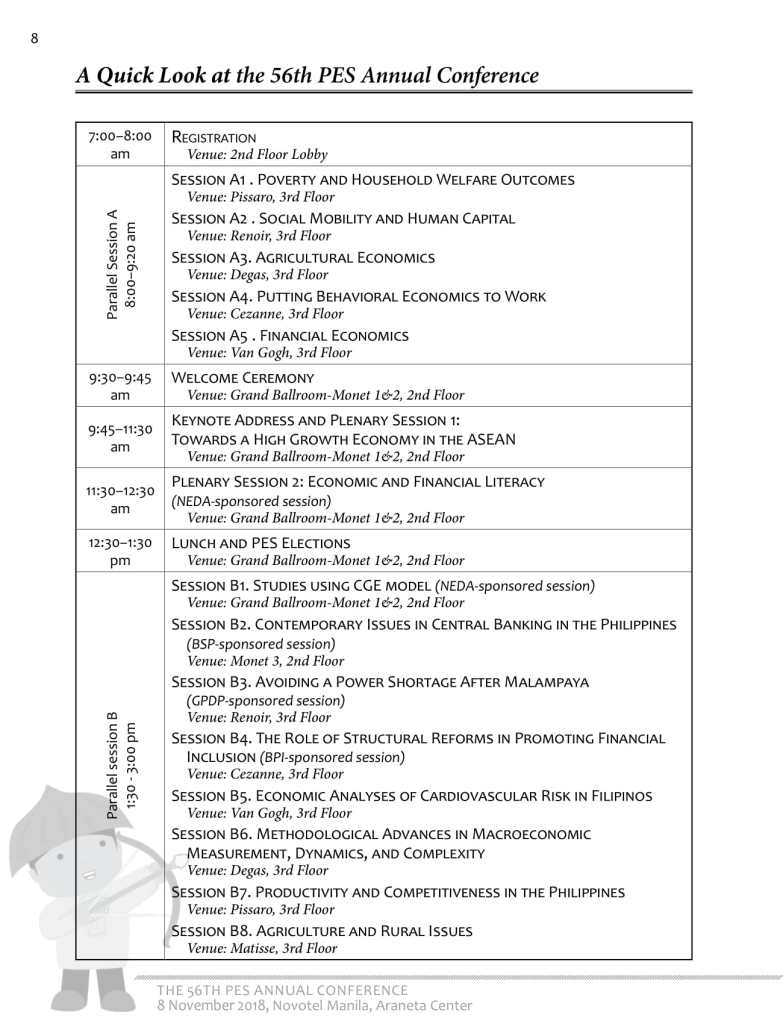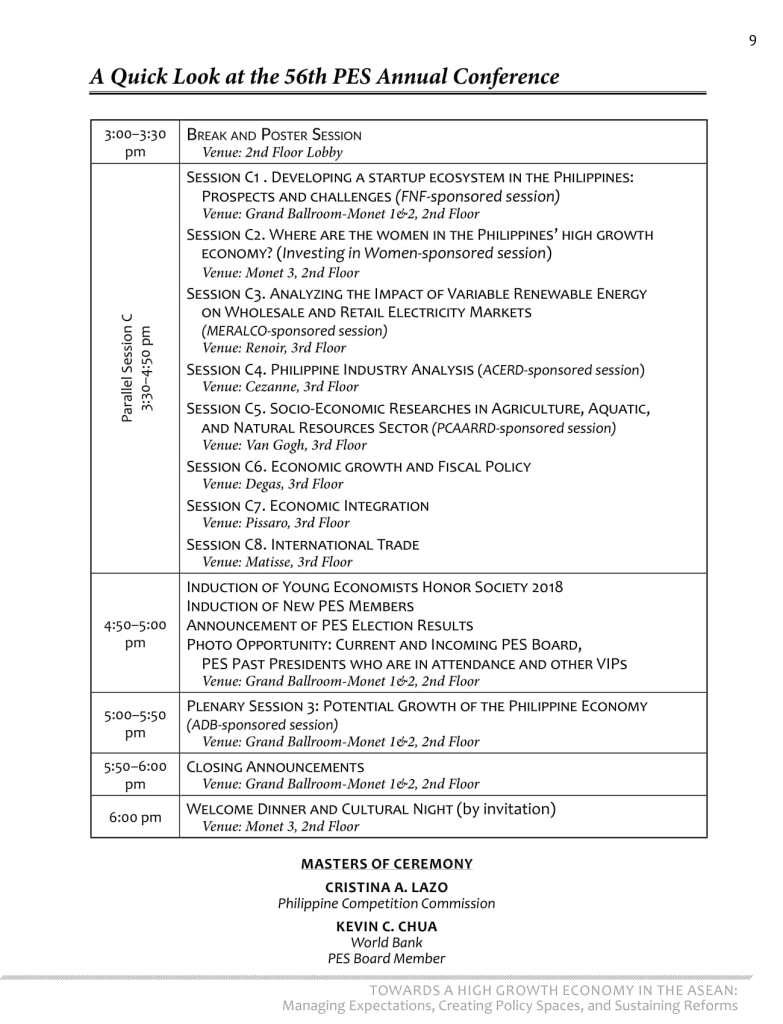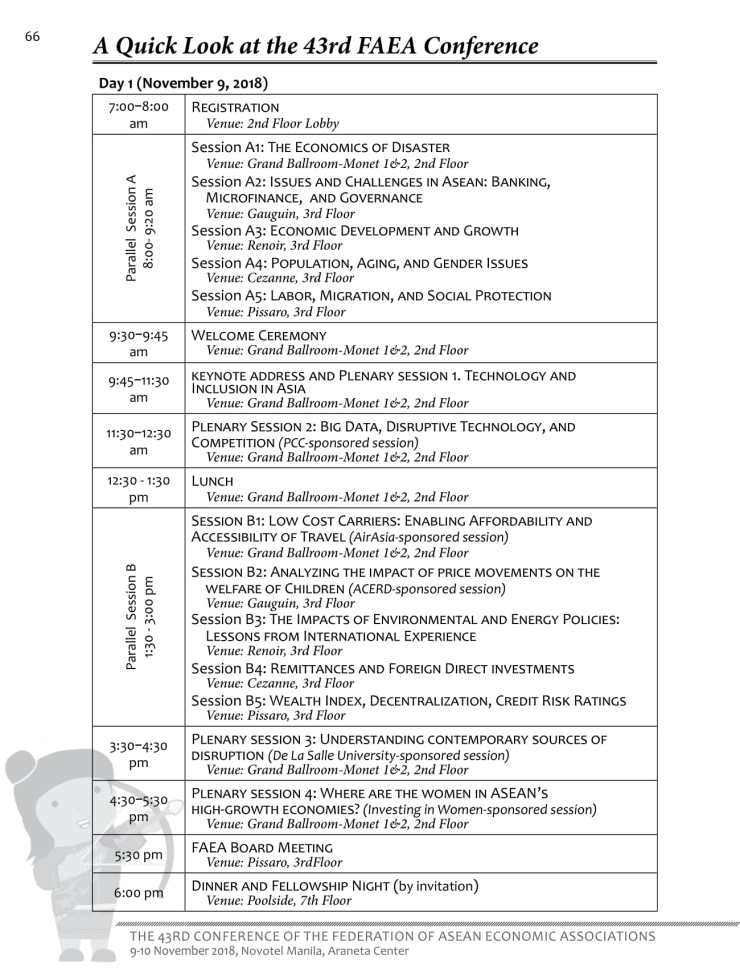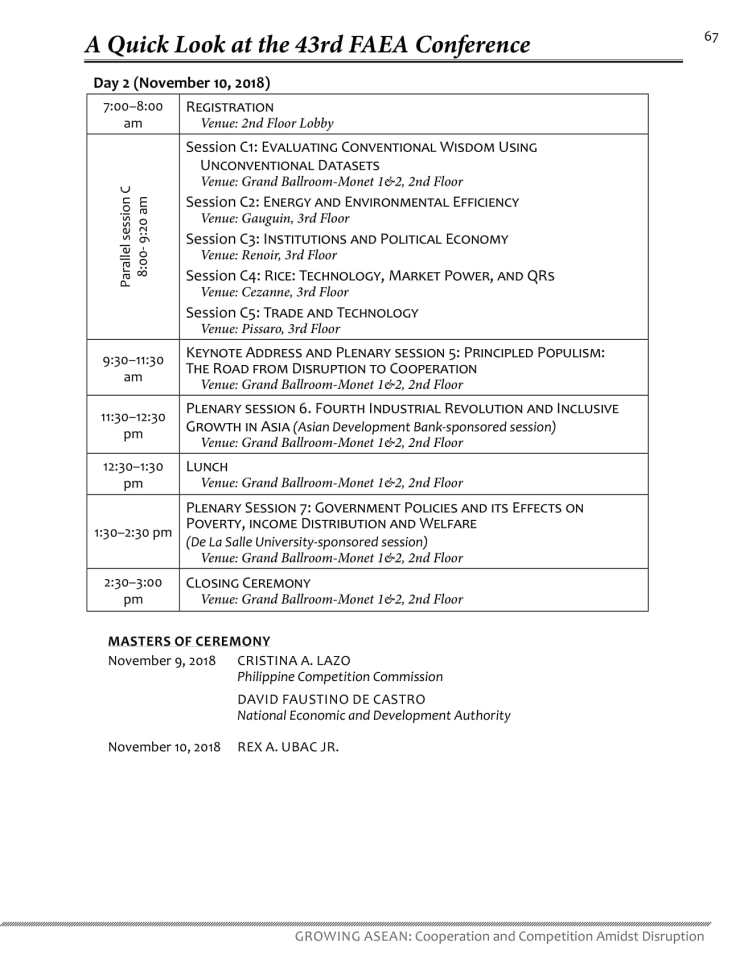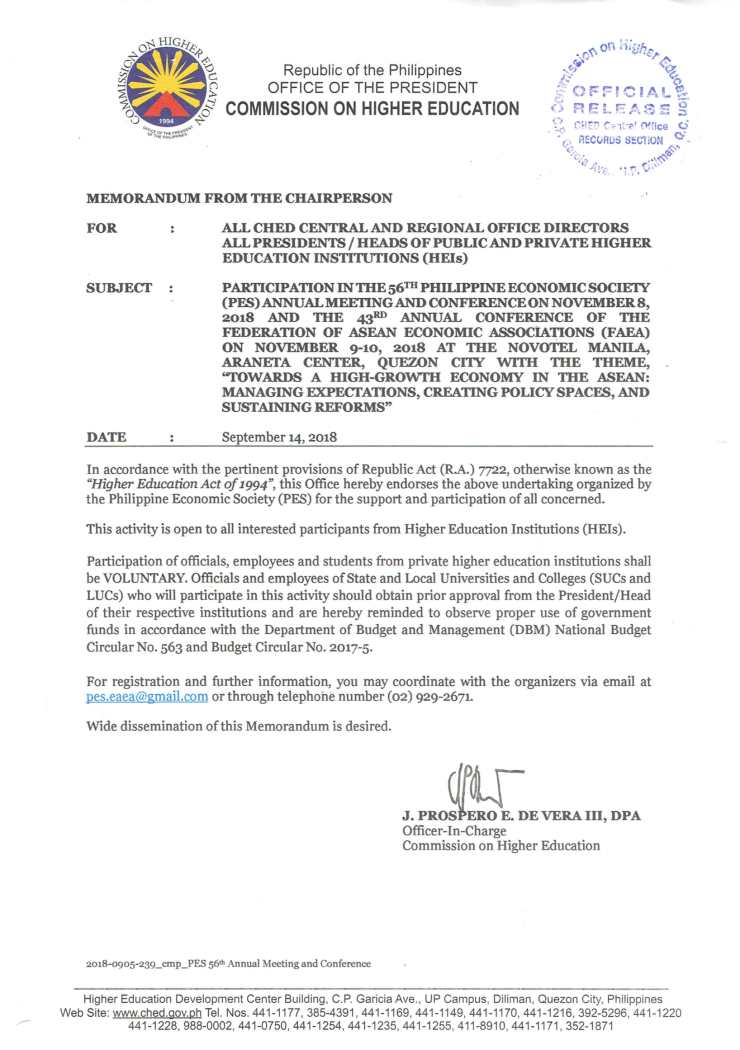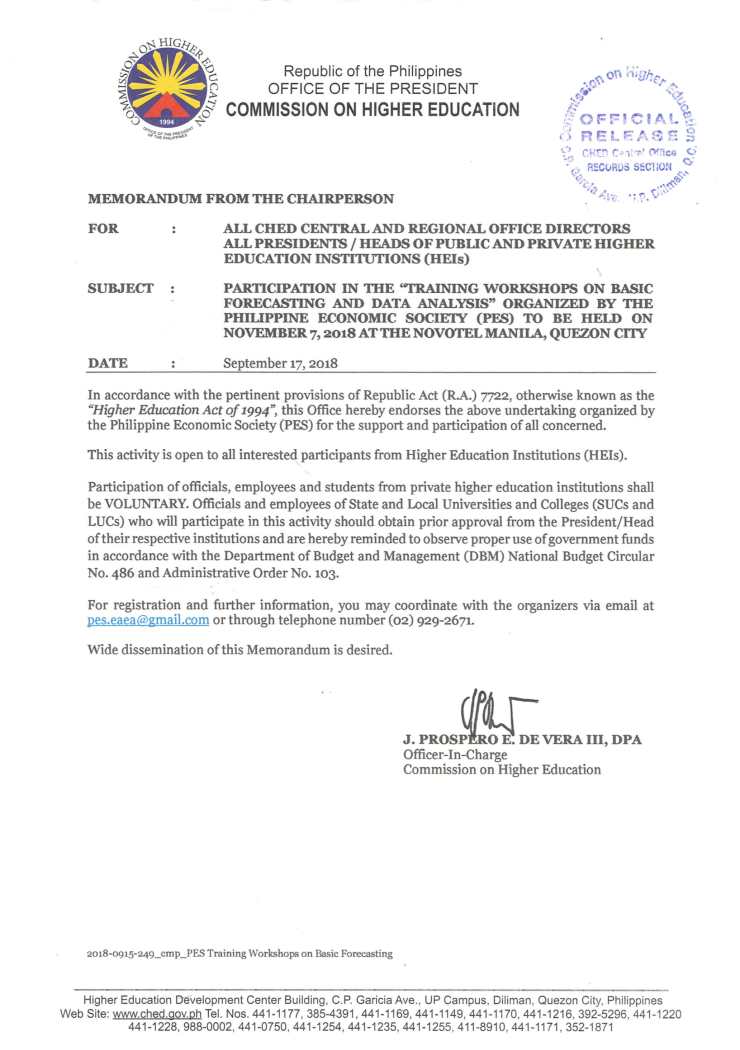Founded in 1962, the Philippine Economic Society (PES) is a nonstock, nonprofit association of economists in the Philippines. The PES seeks to attain the following objectives: (1) to foster and encourage professional and social relations among economists in the Philippines; and (2) to improve the standards of economic research and instruction in the Philippines. Over the years, the Society has served as one of the strongest networks of economists in the academe, government, and business sector. The PES continuously provides a venue for open and free discussion of a wide variety of policy issues through its conferences and fora.
The 56th PES Annual Meeting and Conference
As an integral part of the ASEAN Economic Community (AEC), the Philippines has two remarkably robust anchors—a booming domestic economy and a dynamic ASEAN bloc, both of which are necessary to propel the Philippines as a regional economic powerhouse.
In 2016, the National Economic Development Authority (NEDA) launched the Ambisyon Natin 2040. One of its main objectives is to triple the per capita income over a period of 25 years. The Philippines, however, has yet to join the High Growth Economy Club. Membership into this club will be a truly unprecedented feat that will require a decade of 7% annual growth.
With the implementation of promising and far-reaching fiscal, monetary, and regulatory reforms, there is potential that the Philippines can sustain high growth performance by staying on the correct reform path, managing policy expectations, and learning from high growth economies. Policy spaces can be created through proper reform sequencing, heightened macroeconomic surveillance, and policy coherence and coordination. Regional institutions within ASEAN can help mitigate adverse external shocks through robust intra-ASEAN trade, integrated domestic and regional capital market structures, and sustained policy coordination among policymakers.
It is in the above context that the 56th Annual Meeting and Conference of the Philippine Economic Society is framed with a theme on Towards a High Growth Economy in the ASEAN: Managing Expectations, Creating Policy Spaces, and Sustaining Reforms.
Post Conference Update:
More than 300 participants from the academe, government, and private sector joined the 56th Annual Meeting and Conference of the Philippine Economic Society on 08 November 2018 at the Novotel Manila. The conference theme was "Towards a High Growth Economy in the ASEAN: Managing Expectations, Creating Policy Spaces, and Sustaining Reforms." The conference featured three plenary sessions and 21 parallel sessions delving on various topics in economics and development. The keynote presentation, titled "The Philippine Economy: No Longer the East Asian Exception?," was given by Dr. Hal Hill, Professor Emeritus of the Australian National University. #PESCon2018
Program and Speakers
| Attachment | Size |
|---|---|
| PES 56 Program - Page 1 | 81.91 KB |
| PES 56 Program - Page 1 | 78.94 KB |
Conference Registration
Register Now!
We invite you to join us at the 56th Annual Meeting and Conference of the Philippine Economic Society (PES) on 08 November 2018, to be held back-to-back with the 43rd Annual Conference of the Federation of ASEAN Economic Associations (FAEA) on 09-10 November 2018.
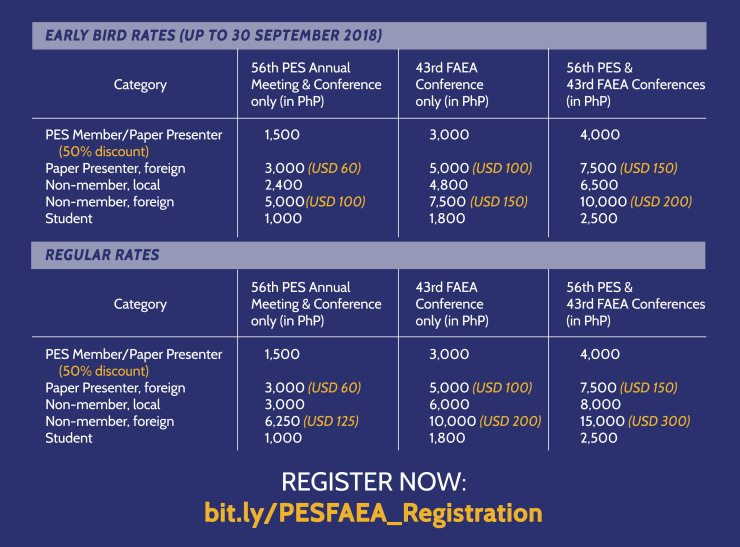
How to register:
STEP 1: Register online through this link. (The registration form is also accessible through bit.ly/PESFAEA_Registration.)
STEP 2: Pay the corresponding registration fee through the following channels:
- Online: bit.ly/PESFAEA_Payment
- Bank Deposit (Please send a scanned copy of your deposit slip to pes.eaea@gmail.com)
- Account name: Philippine Economic Society, Inc.
- Bank: BDO
- Branch: West Avenue-Del Monte Branch
- Account number: SA 408 009 8378
NOTE:
- To avail of the early bird rate, register AND pay on or before 08 October 2018.
- Conference fees are inclusive of a conference program/book of abstracts, conference kit, and meals.
Presentations
Plenary Session (Keynote): Towards a High Growth Economy in the ASEAN
- The Philippine Economy: No Longer the East Asian Exception? (Hal Hill, Australian National University)
Parallel Session A2: Social Mobility and Human Capital
- A Lifetime of Learning and Earning: The Search for a Unified Model of Human Capital for the 21st-Century Industry (Paul John Mendoza Peña, De La Salle University-Graduate School of Economics)
Parallel Session A5: Financial Economics
- Does Bank Competition and Concentration Lead to Financial Stability? (Jovi C. Dacanay, University of Asia and the Pacific)
- An Empirical Study on the Predictive Ability of the Domestic Yield Curve to Forecast Output and Inflation in the Philippines (Gilliane Angela B. De Gorostiza, University of Asia and the Pacific)
- Durations of Trade in the Philippine Stock Market: An Application of the Markov-Switching Multi-Fractal Duration Model (Jennifer E. Hinlo & Agustina Tan-Cruz, University of Southeastern Philippines)
- Price Bubble in Selected ASEAN Agricultural Exports: An Application of the Generalized Supremum Augmented Dickey-Fuller (Karlo Martin C. Caramugan & Purisima G. Bayacag, University of Southeastern Philippines)
Parallel Session B6: Methodological Advances in Macroeconomic Measurement, Dynamics, and Complexity
- Difference between demand and order-based models in artificial stock market (Yoshihiro Nakajima, Osaka City University; Isao Ono, Tokyo Institute of Technology; Naoki Mori, Osaka Prefecture University; Hiroshi Sato, National Defense Academy of Japan; Yuji Aruka, Chuo University)
Parallel Session C2: Where are the women in the Philippines’ high growth economy? (sponsored by Investing in Women, an initiative of the Australian Government)
- Barriers to scaling-up of women-owned SMEs: Results of a firm-level survey (Maribel A. Daño-Luna & Rose Ann Camille C. Caliso, AIM Rizalino S. Navarro Policy Center for Competitiveness)
Parallel Session C5: Socio-Economic Researches in Agriculture, Aquatic, and Natural Resources Sector (sponsored by DOST-Philippine Council for Agriculture, Aquatic and Natural Resources Research and Development)
- Assessing the Status and Forecasting Technical Human Resources Requirement for a Robust Fisheries and Aquaculture Development (Tereso A. Abella, Central Luzon State University; Lily Ann D. Lando, WorldFish; Sarah S. Esguerra, NIRAS International Consulting; U-Primo E. Rodriguez, University of the Philippines-Los Baños; Teresita A. Narvaez, Western Mindanao State University; Fe L. Porciuncula, Central Luzon State University; Marilyn O. Radam, Department of Science and Technology-Region VIII; Charlene P. Corpuz, Philippine Carabao Center; Daniel R. Sanson, Mindanao State University-Iligan Institute of Technology; Ashley Mae O. Arribas, private sector; Jean Grace T. Peralta, Armed Forces of the Philippines)
- An Analysis of the Effects of Transaction Costs on Technology Adoption in the Mango Industry: The Case of PCAARRD’s Recommended Practices for Production and Post-production (Agham C. Cuevas, Rowena A. Dorado & Dan Leo Z. Diona II, University of the Philippines-Los Baños)
Parallel Session C7: Economic Integration
- PPP vs ODA Revisited: Key Issues for Infrastructure Development in the Philippines (Susumu Ito, Chuo University)
(Disclaimer: This page only includes presentations whose authors gave the PES consent to post online their respective presentations.)
CHED Endorsement
| Attachment | Size |
|---|---|
| CHED Endorsement - 56th PES Annual Meeting and Conference | 73.15 KB |
| CHED Endorsement - Trainings, 56th PES Annual Meeting and Conference | 65.22 KB |
 Philippine Economic Society (PES)
Philippine Economic Society (PES)
